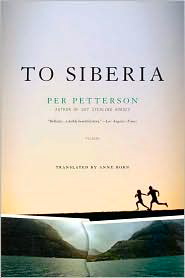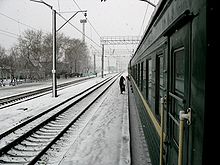“[Her mother] saw the world in images, and the images came from the Old Testament. Before August 29, 2943, the German soldiers were like the swarms of locusts in Egypt, a gray-green penance imposed on an unbelieving people, and when they came into the shop to buy milk, it was the eighth plague she saw.”
Firmly r ooted in the harsh Scandinavian landscape which informs every aspect of his writing, Norwegian author Per Petterson creates novels that appears to spring fully grown from the rocky soil of his Norwegian background. His characters are hardy people who rein in their passions, except when under the influence of alcohol, subduing their private griefs in the cold and brittle emotional climate which surrounds them. His plots, like life, consist mainly of fragile moments—moments of great significance for the individuals living them, but often lacking in drama on a grander scale, and when traumas occur, they are simply accepted as part of life. The overwhelming feeling one gets from reading these novels is a kind of claustrophobia—a feeling of characters being hemmed in, frozen alive, with no escape from the serious business of living, despite the fact that the gray oceans they see all around them appear endless, and the snow-covered fields go on forever.
ooted in the harsh Scandinavian landscape which informs every aspect of his writing, Norwegian author Per Petterson creates novels that appears to spring fully grown from the rocky soil of his Norwegian background. His characters are hardy people who rein in their passions, except when under the influence of alcohol, subduing their private griefs in the cold and brittle emotional climate which surrounds them. His plots, like life, consist mainly of fragile moments—moments of great significance for the individuals living them, but often lacking in drama on a grander scale, and when traumas occur, they are simply accepted as part of life. The overwhelming feeling one gets from reading these novels is a kind of claustrophobia—a feeling of characters being hemmed in, frozen alive, with no escape from the serious business of living, despite the fact that the gray oceans they see all around them appear endless, and the snow-covered fields go on forever.
To Siberia, the latest of Petterson’s novels to be translated into English, continues these themes. Nominated upon its publication in 1996 for the Nordic Council’s Literature Prize (which Petterson won in 2009 for I Curse the River of Time), it is set in Skagen, in Denmark, at the tip of Jutland. The unnamed speaker, who is aged five when the novel opens, is a worrier—a little girl worried about the fierce-looking lions who guard the gate to a nearby house and about her father’s ears freezing and falling off when he does not wear a hat. Her father is a carpenter/joiner, one of the best; her extremely religious mother creates and sings hymns. Neither pays much attention to her.

Almost anonymous, the little girl comes closest to having a name when her devoted brother Jesper refers to her as “Sistermine.” The two are extremely close, though Jesper is three years older, and they spend much time together, sharing their dreams. Jesper plans to become a Socialist and go to Morocco, while Sistermine intends to travel from Moscow to Vladivostok on the Trans-Siberian Railway. Though she knows that Siberia is cold, she also believes that the Siberians have furs to keep them warm, and that’s all that is important to her at this stage of her life.
Time moves back and forth here, and we know very early that the entire novel consists of reminiscences by a sixty-year-old woman whose brother died thirty years before. As we meet her friends, one of whom dies of a mysterious illness when she is a child, we also watch Sistermine and Jesper grow through their teen years, go to a dance, begin to have feelings for the opposite sex, and, more importantly, learn about why their parents remained in a place which enslaved them.
On April 9, 1940, Germany overruns Denmark, killing five Danish soldiers at the border but encountering no resistance, and life does not change very much for the child until two years later, when she is told that she will have to leave school because of lack of money and the war. “What War?” she cries. “Hardly anyone fights in this country…NO ONE DARES TO FIGHT IN THIS COUNTRY.” The Germans have not learned their language and have done nothing except march, dig trenches, bathe in the Frydenstrand, and make suggestive remarks to the wo men. Jesper has become involved with a group that ferries Jews out of Denmark to other countries, successful to the point that very few Jews from Denmark were ever captured. Eventually, Jesper escapes Denmark to Morocco, and Sistermine moves to Copenhagen, Stockholm, and Oslo, having a number of meaningless affairs to feel “alive.”
men. Jesper has become involved with a group that ferries Jews out of Denmark to other countries, successful to the point that very few Jews from Denmark were ever captured. Eventually, Jesper escapes Denmark to Morocco, and Sistermine moves to Copenhagen, Stockholm, and Oslo, having a number of meaningless affairs to feel “alive.”
Dark and often bleak, To Siberia uses its title as a symbol of the yearnings of the main character, and the reader recognizes almost from the outset that she is already in Siberia, emotionally. The denouement, in which the fate of Jesper in Morocco is revealed and the prospects for the speaker are unraveled, keeps the reader firmly grounded in Siberia, that cold and unsympathetic environment similar to the life the speaker knows among her family in northern Denmark. This novel evokes feeling of unmitigated admiration for the skills of the author in creating and telling a story, though the characters remain too distant and private to evoke similar feelings. Siberia wins here.
ALSO reviewed here: Petterson’s I CURSE THE RIVER OF TIME, IT’S FINE BY ME, I REFUSE, ASHES IN MY MOUTH, SAND IN MY SHOES, OUT STEALING HORSES
PHOTOS. The author’s photo by Torunn Nilsen appears on http://www.boston.com
This photo of the Trans-Siberian Railway at Nazivaevskaya (Называевская) station, Siberia, is from http://en.wikipedia.org
